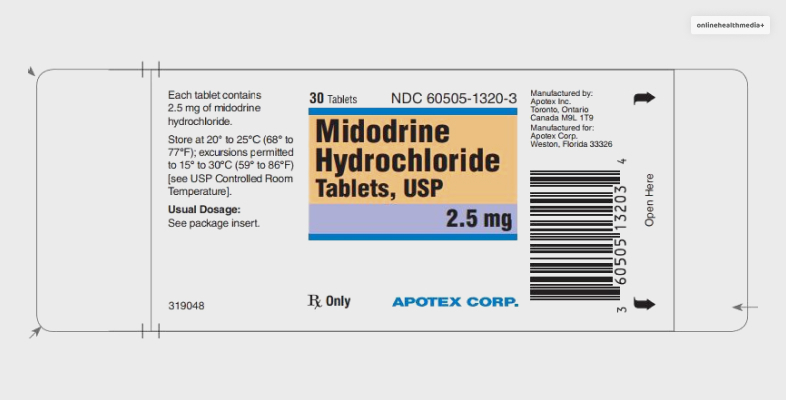Midodrine 101 : Usage, Dosage, Side Effects, And More!
While there are a number of medicines in this world, people have been searching for the usage and side effects of midodrine very recently. If you are one of them and have been searching for the same, then you will find this article to be of help.
While it is true that a doctor may prescribe you a particular medicine, it is best to think twice about taking it. It is best to let your doctor know about all the conditions that you have. In this way, your physician will be able to prescribe the right medicine for you and avoid prescribing some that may affect your health negatively.
In this article, I will be talking about how midodrine can be of help to you and what to keep in mind when you are taking it. So if that is what you are searching for, keep reading this article till the end…
What Is Midodrine?

Midodrine is a blood pressure-raising vasopressor and antihypertensive. Midodrine was supported in the US by the Food and Medication Organization (FDA) in 1996 for the treatment of dysautonomia and orthostatic hypotension.
The FDA proposed to revoke this approval in August 2010 due to the manufacturer, Shire plc’s failure to complete required studies after the medicine was released to the public.
However, only after a month, the FDA “reversed its decision to remove midodrine from the market and allowed it to remain available to patients while Shire plc collected further data regarding the efficacy and safety of the drug.”
Read More: Addtabz Review – Pros, Cons, Ingredients & Is It Safe?
Usage

Now that you know a little about this medicine it is time for you to learn about why it is prescribed or used.
Midodrine is used to treat the condition of low blood pressure or hypotension that causes serious tipsiness or a dizzy inclination, similar to how you could drop. Midodrine should only be used when low blood pressure makes life difficult. Midodrine may not work on your capacity to perform day to day exercises.
How Does It Work?

Desglymidodrine, the pharmacologically active metabolite of midodrine, is produced through metabolism. Desglymidodrine binds to alpha1-adrenergic receptors in the arterial and venous vasculature as an agonist.
An increase in blood pressure and an increase in vascular tone are the two results of activating the alpha1-adrenergic receptor signaling pathways. According to reports, desglymidodrine has no significant effect on cardiac beta-adrenergic receptors.
What Is The Right Dosage?
Follow the instructions on the label of your prescription. Do not take this medication in higher or lower doses or for a longer period of time than prescribed.
Midodrine is generally required 3 times each day, with dosages divided into something like 3 hours separated. Within three to four hours before going to bed, take your last dose of the day. You might take midodrine regardless of food.
According to sources, you can “take this medicine during your normal waking hours, when you are most likely to be upright and not lying down or napping. Ask your doctor about how to take this medicine if you normally lie down during the day.”
What Happens When You Miss The Dose?

In the event of forgetting to take your medicine or dosage, there is no need for you to worry. As soon as you remember, take the dose you missed. If your next scheduled dose is getting close, skip the missed dose. Do not take an additional dose to makeup for the missed one.
You might have to skirt a portion on the off chance that you will rest or if you will be lying down for an extensive stretch of time during your typical waking hours. It is best to have a talk with your primary care physician about how to change your dosage if necessary.
Side Effects

A medicine may have some undesirable side effects besides the beneficial ones. Albeit not these secondary effects might happen, assuming they truly do happen they might require clinical consideration.
In case you are wondering about the side effects of taking this medicine, let me help you out with that. Here are the common side effects that you can experience:
- Pounding in the ears
- Cardiac awareness
- Blurred vision
- Headache
- Itching, burning, or prickling of scalp
- Urinary frequency, retention, or urgency
- Goosebumps
- Chills.
Here are some of the rare side effects of taking midodrine:
- Increased dizziness
- Fainting
- Leg cramps
- Trouble with sleeping
- Backache
- Drowsiness
- Canker sores
- Stomach problems such as gas, heartburn, or nausea
- Weakness
- Flushing
- Confusion
- Anxiety
- Nervousness
- Slow pulse.
Warnings To Keep In Mind

Midodrine may lead to supine hypertension, also known as high blood pressure when lying on your back. Only individuals whose low blood pressure severely restricts their ability to perform daily activities and cannot be successfully treated with other therapies should take this medication.
These medicines are in a lot of non-prescription products, like diet pills and cough and cold medicines, so read the labels carefully. In the event that you experience any of the accompanying side effects, quit accepting midodrine and call your PCP right away: a pounding in your ears, an awareness of your heartbeat, a headache, or blurred vision.
| NOTE: If you have severe heart disease, an overactive thyroid, an adrenal gland tumor, kidney disease, are unable to urinate, or have high blood pressure even when lying down, you should not take midodrine. |
In case you have begun your treatment, your primary care physician or doctor might advise you to keep taking midodrine provided that you have critical improvement in your side effects. It is best to discuss your symptoms while taking this medication with your doctor.
Other Drugs That May Affect Midodrine

In case you are wondering about the drugs that might interact with your dosage of midodrine, here is a list of the drugs that you need to keep in mind:
- Thyroid medicine such as levothyroid or Synthroid
- Heart medicine
- Antidepressant
- Fludrocortisone
- Digoxin
- Migraine headache drugs.
- Droxidopa
- Prazosin, doxazosin, terazosin, or other drugs to treat high blood pressure.
Read More: Opti Men Review – Pros, Cons & Price Of This Multivitamin Supplement
Wrapping It Up!
In case you have been searching for midodrine, I hope that this blog has been of help to you. If there are any other queries related to the same, feel free to let me know.
All that you need to do is scroll down till you reach the bottom of the page. And then leave your queries and suggestions in the comment box below. And I will be there to answer them all for you!
Read Also:
- Symplex F Review – All You Need To Know
- Lumiday Reviews (Facts & Warnings) – All You Need To Know
- Protazen Reviews, Benefits, Side Effects, Ingredients & Is It Safe?



